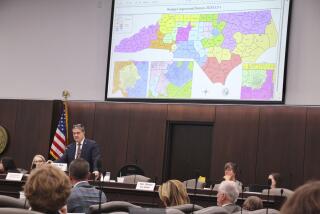Remap Battle May Delay Primary
- Share via
HOUSTON — The Republican campaign to draw new congressional districts in Texas has lasted so long and produced so many competing maps that the state might have to postpone primary elections, GOP officials said Friday.
As a result, voters here might lose the chance to help the nation pick a Democratic presidential candidate next spring.
Republican leaders said that to wade through the map proposals, each generated by members of their political party, they are considering postponing the primary election scheduled for March 2.
Democrats charged all summer that the Republican effort to redraw congressional districts is an unnecessary, expensive power grab. The possibility of a delay in the election -- as well as reports this week that one of President Bush’s friends and business associates is expected to benefit from the new maps -- has renewed criticism of the GOP.
“Delaying the primaries ... will waste tax dollars, interfere with local elections, depress turnout and deprive Texas Democrats of an effective voice in the presidential primaries,” the state Democratic Party said in a statement. “Our primary election date is about as firm as a wedding date for Jennifer Lopez and Ben Affleck.”
Republican leaders pledged to hammer out a compromise this weekend and said they remain hopeful that a final map might be produced early next week, eliminating the risk of having to postpone the election.
“The governor is still confident that the House and Senate negotiators can work out their differences so that it is not necessary [to postpone],” said Gene Acuna, a spokesman for Texas Gov. Rick Perry, a Republican. “There is still time.”
But state officials have determined that they will have to change the election schedule if a map plan is not approved within days. And at this point, said Bob Richter, a spokesman for Tom Craddick, the speaker of the Texas House of Representatives and a Republican from Midland, “there is a huge difference” between competing plans.
If the state has to delay the election, Republican leaders believe the effect would be minimal, Richter said.
“We don’t think it’s that big an issue,” he said. “You may not be the player in the presidential primary that you would be if it was earlier. But we just feel like that’s not a problem.”
Texas’ primary is scheduled for March 2, when 13 states, including California, are scheduled to cast votes for presidential nominees, among other races. Ten candidates are seeking the Democratic nomination; Bush is not expected to face any significant opposition in the Republican primary.
Texas moved its election up to March 2 to give voters more of a voice in the presidential primaries, said Cal Jillson, a professor of political science at Southern Methodist University in Dallas.
If Republicans cannot agree soon, the election might be postponed to March 30. At that point, many analysts believe, the race for the Democratic nomination will have been settled.
“The Republicans, quite simply, don’t care. If they thought of themselves as stewards of state government and saw themselves as having some responsibility, they would be loath to move the election,” Jillson said. “To take this away from Texas Democrats during what for [Democrats] is an exciting election year would be another thumb in the eye.”
Republicans control the Legislature and the governor’s mansion for the first time in 130 years. The party holds all 29 statewide positions. But Democrats hold a 17-15 majority of the state’s congressional seats, which Republicans argue is unfair given the GOP’s popularity in the state. The Republican maps would create districts favorable to the GOP, giving the party as many as 22 of the state’s 32 seats in Congress, Richter said. “We are in the majority, and we deserve it,” said Sue Brannon, chairwoman of the Midland County Republican Party. “It is time.”
Democrats, who say the GOP plan would disenfranchise minorities and rural voters, thwarted the Republicans’ first two efforts to draw new maps by boycotting the Legislature. Now that Democrats have returned to address the issue, it is the Republicans who cannot agree.
“All of this would sound reasonable, I guess, if you had a Democratic Senate and a Republican House, or a Republican Senate and a Democratic House,” Richter said. “But these guys are all Republicans. You can’t blame the Democrats anymore.”
There are several remaining disagreements.
For example, House and Senate Republican leaders cannot agree on how to draw new districts in west Texas. Craddick wants to create a seat in the Midland area that would be represented by someone with knowledge of the region’s energy operations. Leaders of the Senate are pushing a plan that would establish different districts for west Texas.
Richter said the House speaker does not have a candidate in mind for the district. But he acknowledged that K. Michael Conaway, a Bush associate, wants to run for the seat and does not expect any opposition.
Conaway, a certified public accountant, has known Bush for more than 25 years and was a vice president of Bush Exploration for five years. Bush Exploration was one of the companies Bush included in a merger to create Spectrum 7 Energy Corp., later purchased by Harken Energy Corp.
Conaway did not return phone calls.
The White House declined to comment on the map debate. “This is a matter that the state of Texas is addressing,” said White House spokesman Jimmy Orr.
Brannon said Conaway’s knowledge of the energy industry would be good for west Texas. She pointed out that most elite business leaders in west Texas have some affiliation with Bush because of his time as an oilman there.
“President Bush is a very loyal friend and supporter of Midland,” she said. “We all love him and he loves us and we all stick together.”
More to Read
Get the L.A. Times Politics newsletter
Deeply reported insights into legislation, politics and policy from Sacramento, Washington and beyond. In your inbox twice per week.
You may occasionally receive promotional content from the Los Angeles Times.











